In alphabetical order:
Dr Ikechukwu Adinde, CEO, Digital Bridge Institute, Nigeria

Ikechukwu Adinde is currently the Administrator/CEO at the Digital Bridge Institute (DBI), a subsidiary of the Nigerian Communications Commission (NCC). He has more than 25 years cross-sector experience that spans Accounting and Finance, Taxation, Information Technology, Commercial and Investment Banking, Banking Regulation, Advisory/Consulting, Auditing and Public Sector Governance. He stands out with his sound academic and professional qualifications, a strong system and process orientation, thrives on professionalism and integrity and delivering tangible results, profitable growth and operational improvement in diverse organisational spheres. Dr. Adinde is married with children.
Dr Supavadee Aramvith, Associate Professor, Electrical Engineering, Chulalongkorn University

Supavadee Aramvith received her B.S. (first class honors) degree in Computer Science from Ma-hidol University, Bangkok, Thailand, in 1993. She received her M.S. and Ph.D. degrees in Electrical Engineering from the University of Washington, Seattle, USA, in 1996 and 2001, respectively. She joined Chulalongkorn University in June 2001. Currently, she is an Associate Professor and Head of Digital Signal Processing Laboratory at the Department of Electrical Engineering. Her specializa-tions are Video Communication Technology researches. She published over 120 papers in Interna-tional Conference Proceedings and Journals with 3 International Book Chapters. She is a focal point of the Faculty of Engineering, Chulalongkorn University as an academia member of ITU. She has rich project management experiences as the project leader and technical advisor to the NBTC and the formerly MICT of Thailand. In addition, she is very active in the international arena with JICA Project for AUN/SEED-Net, IEEE, IEICE, and APSIPA.
Dr Sara Bernardini, Lecturer, Department of Computer Science, Royal Holloway University, United Kingdom

Dr Sara Bernardini is a Lecturer in AI in the Department of Computer Science at Royal Holloway University of London. Previously, she was a Research Associate at King's College London and UCL and a Research Scientist at NASA Ames Research Center. Sara received her PhD degree in Artificial Intelligence from the University of Trento and her Master degree in Computer Science and Engineering from the University of Rome "La Sapienza".
Sara's research interest revolves around designing and building intelligent and autonomous agent and multi-agent systems through automated decision-making techniques. In particular, Sara has been conducting extensive research on automated planning, intelligent control and probabilistic reasoning for complex real-world applications. Her past projects include task planning for space mission operations, serious games and adaptive technology. Her current projects focus on autonomous surveillance and disaster response missions using networks of fixed and mobile sensors, both in aerial and underwater domains.
Sara teaches at the Master in IoT at Royal Holloway, and her courses focus on designing and building networks of sensors and actuators for practical applications.
Mr Istvan Bozsoki, Head, Telecommunications Network and Spectrum Management, ITU

Mr Istvan Bozsoki joined the ITU in 1997 to work at the Space Department of the Radiocommunication Bureau and he was dealing with coordination and notification of satellite systems. In 2007 he moved to the Telecommunication Development Bureau and was responsible for spectrum management and broadcasting issues. In April 2013 he became Head of Spectrum Management and Broadcasting Division and since November 2016 he is Head, Telecommunications Network and Spectrum Management Division (TND).
After obtaining his degree in telecommunication engineering at the Technical University Budapest in 1980 he spent 17 years at the Hungarian Communication Authority and he was dealing with technical and regulatory aspects of the spectrum management. Among others, he was responsible for the development of a computerized spectrum management system. Later, he was appointed as director of international affairs. He has a master degree in radiocommunications and broadcasting.
Mr Ryan Budish, Senior Researcher, Berkman Center for Internet and Society, Harvard University, United States

Mr Ryan Budish is a Senior Researcher at the Berkman Klein Center for Internet & Society at Harvard University. Ryan joined the Berkman Klein Center in 2011 as a Fellow. Ryan has been deeply involved in the Center's Internet governance work, leading the Center's contribution to the U.S. Department of Commerce (NTIA's) assessment of ICANN's proposed reforms as a precursor to the IANA transition in 2016. This work, conducted in collaboration with legal scholars from the Columbia and Brooklyn Law Schools, consisted of an independent review of the Cross Community Working Group's proposed reforms in order to determine the extent to which they complied with good governance principles. In addition, Ryan has led the Center's work studying the design of governance structures, with a report encompassing and synthesizing twelve case studies examining a geographically and topically diverse set of local, national, and international governance models, components, and mechanisms from within and outside of the sphere of Internet governance. Beyond Internet governance work, Ryan has directed several significant initiatives relating to Internet censorship, corporate transparency about government surveillance, and artificial intelligence. Ryan received his J.D. cum laude from Harvard Law School, where he was an editor fo the Harvard Law.
Dr Lee Andrew Bygrave, Professor, Department of Private Law, University of Oslo, Norway

Lee A. Bygrave is Professor at the Department of Private Law, University of Oslo, where he is also Director of the Norwegian Research Center for Computers and Law. For the past three decades, Lee has been engaged in researching and developing regulatory policy for information and communications technology (ICT). He has functioned as expert advisor on ICT regulation for numerous organisations, including the European Commission, Nordic Council of Ministers, Internet Corporation for Assigned Names and Numbers, Norwegian Government and Telenor ASA. He currently heads a major five-year research project on legal aspects of cybersecurity – ‘Security in Internet Governance and Networks: Analysing the Law’ (SIGNAL). Lee has published particularly extensively within the field of privacy/data protection law where his two principal books on the subject – Data Protection Law: Approaching Its Rationale, Logic and Limits (Kluwer Law International, 2002) and Data Privacy Law: An International Perspective (Oxford University Press, 2014) – are widely acknowledged as standard international texts. His most recent book – Internet Governance by Contract (Oxford University Press, 2015) – critically examines the contractual frameworks for the development and use of internet infrastructure.
Dr Virginia Dignum, Associate Professor, Social Artificial Intelligence, Delft University, Netherlands
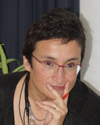
Virginia Dignum is Associate Professor on Social Artificial Intelligence at the Faculty of Technology Policy and Management at TU Delft. She holds a PhD from the Utrecht University, in 2004. Prior to her PhD, she worked for more than 12 years in business consultancy and system development in the areas of expert systems and knowledge management. Her research focuses on value-sensitive design of intelligent systems and multi-agent organisations, in particular on the formalisation of ethical and normative behaviours and of social interactions. In 2006, she was awarded the prestigious Veni grant from NWO (Dutch Organization for Scientific Research) for her work on agent-based organizational frameworks. She has wide experience with obtaining research funding both at national as international level. She has given keynote speeches on her work at many leading conferences, is member of the reviewing boards for all major journals and conferences in AI and has chaired many international conferences and workshops. She has published several books and more than 180 peer-reviewed papers. She is member of the Executive Committee of the IEEE Initiative on Ethics of Autonomous Systems and director of the new MSC program on AI and Robotics at TU Delft.
Dr William Drake, International Fellow and Lecturer, Institute of Mass Communication and Media Research, University of Zurich, Switzerland

William J. Drake is an International Fellow and Lecturer in the Institute of Mass Communication and Media Research at the University of Zurich. He is also a member of the Nominating Committee of the Internet Corporation for Assigned Names and Numbers (ICANN); a faculty member of the European and South schools on Internet governance; and an Affiliated Researcher at the Institute for Tele-Information, Columbia University. Previously he was: Senior Associate at the Centre for International Governance at the Graduate Institute for International and Development Studies; President of Computer Professionals for Social Responsibility; Senior Associate and Director of the Project on the Information Revolution and World Politics at the Carnegie Endowment for International Peace; founding Associate Director of the Communication, Culture and Technology Program, Georgetown University; Assistant Professor of Communication at the University of California, San Diego; and Adjunct Professor at the School of Advanced International Studies and the Georgetown School of Business. Recent books include, Drake (ed.), The Working Group on Internet Governance: 10th Anniversary Reflections (Johannesburg: The Association for Progressive Communications, 2016); and Drake and Monroe Price (eds.), Internet Governance: The NETmundial Roadmap (Los Angeles: USC Annenberg Press, 2014). PhD, Political Science, Columbia University.
Dr Ekkehard Ernst, Chief Macroeconomist, ILO

Ekkehard Ernst is Chief of the Macroeconomic Policies and Jobs Unit at the International Labour Organization, where he is responsible for understanding the Future of Work and analysing alternative paths for jobs and earnings to improve upon current trends. For this he uses both scenario techniques and quantitative predictive tools to uncover hidden trends and challenges for policy makers and business. His work helps decision makers in understanding developments in skills and labour costs around the globe, providing them with the necessary intelligence to make effective long-term decisions. He is a regular speaker at international conferences where he presents his latest insights and organises a yearly summer academy together with the International Training Center in Turin, Italy, where he gives hands-on advice on the tools he is using. Before joining the ILO in 2008 he worked at the Organization for Economic Cooperation and Development (OECD) and the European Central Bank. He has published extensively in the area of labour market trends and reforms and the impact of financial markets on jobs. Ekkehard Ernst has studied in Mannheim, Saarbrücken and Paris and holds a PhD from the École des Hautes Études en Sciences Sociales.
Dr Anders Flodström, Education Director, EIT Digital

Anders Flodström is professor in Physics (H50). His first position after PhD graduation was with Xerox PARC in the Valley, where he worked on the development of materials for optical storage and lasers. Later, at NIST he did research on materials for energy applications. For 10 years he walked in white clogs building up a global research group using synchrotron radiation. In Sweden he started a company producing optical storage discs for data and music. In 1996 he became the President of Linkoping University and three years later of the Royal Institute of Technology (KTH). In 2008 the Swedish Government appointed him University Chancellor of Sweden with the full quality responsibility of higher education.
In 2006, Professor Flodström worked with EU (BEPA) on creating the European Institute of Innovation & Technology (EIT). He became a GB member of the EIT Board (vice chair) in 2008 and joined EIT Digital as Education Director (CEdO) in 2012. At present, he is still the CEdO for EIT Digital. He is on the Board of I4J foundation and also active in the task of formulating new ideas in “Innovation for Jobs” or how to create and annihilate.
Mr Atif Hamad, Deputy Director, Sudacad, Sudan
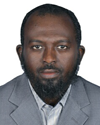
Atif Hamad is a Senior Manager, Planning & Development at Sudatel Telecommunications Academy (Sudacad). He has over 20 years of experience in the ICT industry, heavily involved in planning, installation, O&M of many ICT technology trends. He has over 10 years of experience in the field of capacity building.
Mr Hamad is a member of the Steering Committee of the ITU Centres of Excellence network for the Arab Region since December 2014. As a lecturer at many universities (Faculty of Engineering), he conducts courses on different ICT topics.
He holds a B.Sc in Electrical Engineering from the University of Khartoum, Sudan. He also holds an M.Sc in Telecommunication & Information Systems and an MBA from the University of Khartoum.
Mr Zaid Hamzah, CEO and General Counsel, Asia Law Exchange, and Adjunct Fellow, Centre of Excellence for National Security, RSIS, Nanyang Technological University, Singapore
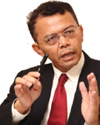
A technology and innovation counsel, Zaid has over 30 years of professional experience spanning both industry as well as government service where he specializes in technology and cybersecurity. Author of nine books including “E-Security Law & Strategy”, Zaid was a former Director at Microsoft where he was responsible for government engagement as well as intellectual property. Zaid has also served as Chief Legal & Regulatory Officer at listed Telekom Malaysia where he was responsible among others for the legal and regulatory aspects of Malaysia’s high speed broadband rollout. In the area of cybersecurity, Zaid has developed a manual for the management of digital evidence for cybersecurity for a Malaysian government agency. In 2014-2015, Zaid acted for the international joint venture between Singapore Telecommunications, Warner Brothers and Sony Picture Entertainment in the media content business. An advocate of strategic learning and programs to secure RoI in learning, Zaid teaches intellectual property and cybersecurity law at the Singapore Management University. He is also an Associate Lecturer at RMIT University where he teaches the Law of Investments and Financial Markets in the Singapore-based program. An avid writer, Zaid enjoys travelling to widen his cultural horizon and to constantly reshape his worldview. He is married with two children.
Dr Fabiano Hessel, Coordinator, Smart City Innovation Center, Tecnopuc Science and Tecnology Park, Pontifícia Universidade Católica do Rio Grande do Sul, Brazil

Fabiano Hessel is Associate Professor of Computer Science at PUCRS (Brazil), Research Productivity Scholarship from CNPq and acts as Advisor in the Office of the PUCRS Vice-President for Innovation, Research and Development. He received his Ph.D. in Computer Science from Joseph-Fourier University, France (2000). He is the head of Embedded System Group (GSE) and the Coordinator of the Smart City Research and Innovation Center at PUCRS. Professor Hessel is member of the IEEE and of the Brazilian Computer Society (SBC). He also participates in the IEEE IoT and Smart Cities interest groups. He was the Associate Editor of the ACM Transaction on Embedded Computer Systems, General Chair and/or Program Chair of IEEE RSP, CBSEC and IEEE RFID Brasil, and Brazil and South America Representative of ISQED. He participates in several technical/programme committees of prestigious conferences and journals. He had several publications in prestigious conferences and journals, book chapters and books. His research interests are embedded real-time systems, RTOS and MPSoC systems applied to Internet of Things (Healthcare/Homecare/Telemedice) and Sustainable+SmartCities.
Dr Jeanette Hofmann, Director, Alexander von Humboldt Institute for Internet and Society, Germany
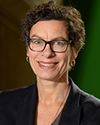
Jeanette Hofmann is a political scientist with a focus on Internet governance. At the WZB Berlin Social Science Center she heads the project group 'The Internet Policy Field', which studies the institutionalization of Internet regulation on the national level. She is co-director of the Berlin-based Alexander von Humboldt Institute for Internet and Society and professor of Internet policy at the Freie Universität Berlin. Current research interests include modes of global governance including multi-stakeholder processes, and the relationship between digitalisation and democracy. In addition to her academic work, Jeanette has been involved in various transnational processes such as the UN World Summit on the Information Society, the Internet Governance Forum, NetMundial, and, as an expert member, in the committee of inquiry of the German Parliament "Internet and Digital Society".
Dr Jan Holub, Professor, Faculty of Electrical Engineering, Czech Technical University, Czech Republic
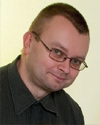
Prof. Ing. Jan Holub, Ph.D., is Head of Department of Measurement, FEE CTU Prague. After defending his PhD thesis in 1999 he started to work as an assistant professor there. In 2004 he became associate professor (New Methods for Objective Voice Transmission Quality Measurements and Their Applications) and in 2016 full professor. His research interests and activities cover AD and DA converters, digital signal processing, psychoacoustics and measurements in telecommunication networks. He was awarded several patents and published more than 30 articles in scientific magazines and 110 contributions for conferences, mostly international. In 1999 he established MESAQIN.com Ltd., MESAQIN.com deals primarily with speech, audio and multimedia subjective testing. Since the company establishment in 1999, MESAQIN.com has been involved in various standardisation projects including ETSI EG 202 396-2 (2006), ITU-T SG12 P.863 (2010), ETSI TR 103 121 (2013) or 3GPP SA4 EVS (2014), collecting multiple millions of subjective votes in total.
Dr Toni Janevski, Professor, Faculty of Electrical Engineering and Information Technologies, Ss. Cyril and Methodius University in Skopje, TFYR Macedonia

Dr. Toni Janevski is a full professor in telecommunications at the Faculty of Electrical Engineering and Information Technologies (FEEIT), Ss. Cyril and Methodius University (UKIM), Skopje, Macedonia. During 1996-1999 he worked for T-Mobile, Macedonia. From 1999 he is with FEEIT. During 2005-2008 he was Member of the Commission of the Agency for Electronic Communications in Macedonia. In 2008-2016 he was Member of the Senate of UKIM. In 2009 he established at FEEIT an ITU Centre of Excellence. He is author of several books from well-known publishers, including “Traffic Analysis and Design of Wireless IP Networks”, Artech House, 2003; "NGN Architectures, Protocols and Services", Wiley, 2014; "Internet Technologies for Fixed and Mobile Networks", Artech House, 2015. He received “Goce Delchev” state award for science in 2012, and “UKIM best scientists” award for 2013 (both can be received once in a lifetime). He successfully tutored many ITU Academy courses since 2009.
Dr Monika Karas, President, National Media and Infocommunications Authority of Hungary
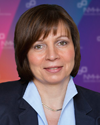
With decades of experience as an attorney, legal expert and media law specialist, Dr. Monika Karas was elected President of the Media Council of the National Media and Infocommunications Authority by the Hungarian Parliament on 9 September 2013. Born into a Budapest family of engineers, her interest in law began while still in secondary school. After graduating from the English programme at the Arany János Bilingual High School, she started her legal studies in 1980 at the Faculty of Law of ELTE University, graduating summa cum laude in 1985. Three years later Dr. Karas passed the bar exam.
Throughout her career Dr. Karas was involved at many professional and community organisations. Between 1999 and 2002 she chaired the Grievance Committee of the National Radio and Television Board, also serving as member of the Council of Copyright Experts from 2000 until 2005. For a single-year term she was elected into the Disciplinary Board of the Budapest Chamber of Lawyers in 2002. Between 2008 and 2012 she was member of the Hungarian Publishers’ Association, and board member of the Association for the Reprographic Rights of Publishers.
A mother of two, she is married to a former canoe world champion and master instructor at Semmelweis University. Childhood music education being a source of lifelong memories, her taste in music is also heavily influenced by her sons. Her German language skills are a result of her affection for German culture.
Dr Hans Klein, Associate Professor, School of Public Policy, Georgia Tech, United States

Hans K. Klein is an Associate Professor in the School of Public Policy at the Georgia Institute of Technology (Georgia Tech). He has published articles on Internet governance, Internet and democracy, social movements, U.S. technology policy, and community media. Klein formerly chaired the board of Computer Professionals for Social Responsibility (CPSR) and led its activities in Internet governance. His research is grounded in institutional theory, social constructionism, global governance theory, and large technical systems.
Klein received a Ph.D. in 1996 in political science at MIT, an M.S. in 1993 in Technology and Policy at MIT, and a B.S.E. in 1983 from Princeton University’s Department of Electrical Engineering and Computer Science. He has also studied at the Technical University of Munich and been a visiting researcher at the Ecole des Mines in Paris. Klein worked in the European software industry for Siemens (Munich), Schlumberger (Paris), and Olivetti (Milan). He has consulted for the U.S. Department of Transportation and the National Academy of Engineering.
Some publications include: - “Understanding WSIS: An Institutional Analysis of the UN World Summit on the Information Society,” Information Technology and International Development, “Special Issue on WSIS.” MIT Press, Vol.1, No. 3-4, Spring-Summer 2005, pp. 3-13. - “The social construction of technology: Structural considerations,” Science, Technology, & Human Values 27 (1), 28-52. - “ICANN and Internet governance: Leveraging technical coordination to realize global public policy,” The Information Society 18 (3), 193-207. With Daniel Kleinman.
Dr Zsuzsanna Kosa, Associate Professor, Department of Telecommunications and Media-informatics, Budapest University of Technology and Economics, Budapest, Hungary
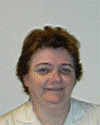
Dr. Kosa has graduated with MSc in Electronic Engineering in 1978 from Budapest University of Technology and Economics. She has also received a degree as an engineer-economist in 1983 from Budapest Cornivus University in Budapest. She received her doctoral degree in business administration in 1996. Her doctoral topic was on corporate management. Dr Kosa has earned a second doctoral degree in 2006, also on business administration with a topic on the strategy of Regulation in the Hungarian Communication sector.
Currently, Dr. Kosa is teaching information management, business management to engineering students, among other subjects such as electronic business, financial analytics, trend analysis, etc. Her most popular course is "Digital way of Living." Her research area is interdisciplinary and focuses on how information technologies transform the whole economy, how does the future-oriented technology analysis look like and what are the related regulations and strategies.
Dr Santhi Kumaran, Associate Professor, Department of Computer Engineering and Director, African Center of Excellence in Internet of Things, University of Rwanda, Rwanda

Dr. Santhi Kumaran is currently the Director of the African Center of Excellence in Internet of Things (ACEIoT) which is a World Bank Initiative at University of Rwanda. She has over 25 years of experience in teaching and research and has 40+ international publications. She received the IBM Faulty Award for the year 2010. She is an Associate Professor in Computer Engineering and has undertaken responsibilities as Dean-School of ICT, Deputy Director-KIST eHealth Center of Excellence, and Manager-African Virtual University (AVU) KIST Learning Center at the University. She has been the Technical programme committee member for many of the international conferences and have organised many workshops.
She has established various local, regional and international links by being the focal point for many ICT related initiatives including some of the EU FP7 projects. Her research focus is in the field of IoT4D. She is involved in establishing ACEIoT partnerships with various industries like Inmarsat, PTC, XM2 and IBM to increase the research impact of ACEIoT.
Dr Diego Kuonen, CEO and CAO, Statoo Consulting and Professor, Research Center for Statistics, Geneva School of Economics and Management, University of Geneva, Switzerland

Professor Dr Diego Kuonen, CStat PStat CSci, founded in 2001 Statoo Consulting, a software-vendor independent Swiss consulting firm, where he serves as CEO and CAO. He has extensive experience in applying statistical engineering, statistical thinking, statistics, data science – a rebranding of data mining – and big data analytics within large and small companies and organisations in Switzerland and throughout Europe.
In addition, he is also since 2016 Professor of Data Science at the Research Center for Statistics at the Geneva School of Economics and Management (GSEM) at the University of Geneva, Switzerland, and Founding Director of GSEM’s new Master of Science in Business Analytics program.
He received his PhD degree in Statistics (“Doctor in Science EPF”) from the Swiss Federal Institute of Technology in Lausanne (EPFL), Switzerland. Initially, he graduated with a Master’s degree in Applied Statistics (“MSc in Mathematics”) from the EPFL in 1998.
In May 2017 Professor Dr Diego Kuonen, CStat PStat CSci, was ranked 26th within Onalytica’s global “Big Data 2017: Top 100 Influencers and Brands” list.
Currently, he is also the Principal Scientific and Strategic Big Data Analytics Advisor and Consultant for the Directorate and the Board of Management of the Swiss Federal Statistical Office (FSO) in Neuchâtel, Switzerland.
Further information is available at
about.me/DiegoKuonen
Dr Andres Navarro, Professor, Department of Information and Communication Technologies, ICESI University, Colombia
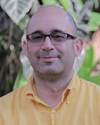
Electronic Engineer (1993), Master on Technology Management (1999), both from Universidad Pontificia Bolivariana in Medellín, PhD in Telecommunications from Universitat Politécnica de Valencia (2003). IEEE Senior Member, Advisor of the National Innovation Program on Electronics, Telecommunications and Informatics from Colombian R&D+I system, and advisor of the Spectrum Management Committee for Colombian Spectrum Agency; ITU expert number 05228. Participant on COST Action CA15104 IRACON and former actions COST IC1004 and COST 2100. Director of the i2t research group at Universidad Icesi since 1999. His research interest are Spectrum Management, mobile radio planning, radio propagation and m-health.
Mr Mike Nxele, Senior Human Capacity Building Officer, Human Capacity Building Division, ITU
Mike Nxele is the Senior Human Capacity Building Officer within the Human Capacity Building division of the Bureau of Telecommunications Development of the International Telecommunication Union (ITU). He is based at the ITU Headquarters in Geneva.
Prior to joining ITU in 2002, Mike Nxele worked as Human Resources Director within the incumbent fixed telecommunications organization in his native country, Zimbabwe.
Dr Carmen Oriondo, Training Coordinator, INICTEL-UNI, Peru
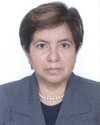
Carmen Oriondo is the supervisor of the ITU Centre of Excellence at the National Institute of Research and Training in Telecommunications of the National University of Engineering – INICTEL-UNI, in Lima-Peru. She graduated from the same university, with bachelor degree in Electrical Engineering. She obtained a Master’s in Science in Education. She also obtained a Master Degree and Doctorate in Business Administration. She has participated in postgraduate programs in Japan, Korea, Spain, United Kingdom and in the USA.
Her career in Telecommunications involved several activities related to training, software development, projects, concessions, licenses, technological transfer and entrepreneurship.
She is responsible for the India-Peru Center of Excellence in Information Technology and for the CISCO’s Support Center for more than 30 Peruvian Academies, besides the current portfolio of more than 300 regular and virtual courses. At present she is working to implement the first BICSI’s ADTP in Peru.
Dr Piotr Pluta, Director Corporate Affairs, Europe, Middle East, Africa and Russia, Cisco

Piotr has started his career in Cisco twelve years ago by joining the European leadership team in CEE region. Since 2012 he has been leading Cisco Corporate Affairs in Europe, Middle East, Africa and Russia with broad responsibility for Cisco Corporate Social Responsibility Programs in the region. Piotr is a board member of E-Skills Association and Academy Cube gGmbH, the NGO co-founded by Cisco.
Between 2008 and 2012 Piotr has been leading the Public Sector Business Development Practice in Central Europe, Emerging Markets, EMEA and Global Public Sector. In those years the Public Sector department reached a new level of cooperation with Central Government organizations and Government Enterprises. Business Development, Marketing, Government Informatization, E-Society Development, Transformation of Healthcare and Education are main areas of Piotr’s competence and experience. He has lead Cisco’s Sales Organisation and close cooperation with governments of Lithuania, Latvia and Estonia as Cisco General Manager in the Baltic States region in 2005-2008.
Before Cisco Piotr built his experience in different leadership roles. In Ford Motor Company he was Sales Director of Polish Operations and lead HR in CEE. He spent his first years of career in Coca-Cola and Eli Lilly where he gained international experience. He was in management roles in four different industries – pharmaceuticals, FMCG, automotive and high-tech.
Piotr is a Harvard University Alumni concluding Innovation for Economic Development program, and a Stanford University Alumni - Leading Growth – Executives Education. He graduated as a Medical Doctor in Poland. This background enables him to be trusted advisor to government and enterprise leaders. Piotr lives and works in Switzerland. His hobbies are travelling, skiing, running and music. He always tries to achieve good work-life balance and spend as much as possible with his family.
Dr Joseph Sevilla, Director, @iLabAfrica, Strathmore University, Kenya
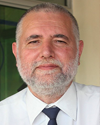
Dr Joseph Sevilla is the founder and Director of @iLabAfrica, a research centre at Strathmore University. He graduated as an Industrial Engineer (Universidad del País Vasco, Spain) and holds an MSc in Computer Science (University College London, UK) and a PhD in Bioinformatics (TECNUN, Universidad de Navarra, Spain). Dr Sevilla is a member of the British Computer Society and the Council of the Free Software and Open Source Foundation for Africa (FOSSFA)., the Safaricom Innovation Board, Chairman of the Document Description and Processing Languages Technical Committee of the Kenya Bureau of Standards (KBS).
He has held the office of Deputy Vice Chancellor, Dean of the Faculty of IT and member of the University’s Management Board. Dr Sevilla has been involved in a number of committees established by the Ministries of Education, Research, Technical Training and Technology, and Information and Communications; he has advised the Kenyan Government and the ICT Board on the drafting of national policies in ICT education, the national syllabus for Computer Studies in schools and the adoption of a national ICT strategy. He has also acted as an advisor to the Kenyan Directorate of Industrial Training in issues related to computer training.
Mr Enrique Shadah, Head, Strategic Relationships, Office of Digital Learning, MIT, United States

Enrique is the Head of the Workplace Learning Collaborative at MIT’s Abdul Latif Jameel World Education Lab (
J-WEL). In this role, he is responsible for leading a community of academics, practitioners and learning professionals to rethink workplace learning and the organizations that support it Enrique has helped executives in large publicly traded and privately-held companies in Spain, Mexico, France, and several U.S. cities develop successful research collaborations with members of the MIT community.
Prior to joining J-WEL in 2016, Enrique was a Senior Industrial Liaison Officer at MIT’s Office of Corporate Relations Industrial Liaison Program (ILP). In that role, Enrique managed strategic relationships with executives and technical leaders in Spain and Latin America, in industries such as construction, banking, healthcare, manufacturing, mining, oil and gas and software development. Enrique was the creator of MIT’s Startup Exchange, an online tool that enables interactions between ILP’s corporate members and MIT-connected startups (
http://startupexchange.mit.edu).
Prior to MIT, Enrique advised small and large firms on venture creation, helped business founders liquidate their holdings, led product development a VC-backed startup in Boston, and started three venture projects, one of which is still ongoing.
Enrique earned a Masters in Business Administration from Babson College in Wellesley, Massachusetts (Magna Cum Laude) and a Bachelors of Science Degree in Mechanical Engineering from Universidad Simón Bolívar in Caracas, Venezuela. Enrique is fluent in English and Spanish and has basic knowledge of Portuguese.
Dr Paula Alexandra Silva, Lecturer, Design Innovation, Maynooth University, Ireland

Dr Paula Alexandra Silva is a Human-Computer Interaction (HCI) scientist, researcher, and practitioner whose passion is to understand how technology can be leveraged to create a better future for us all, by improving everyday life and developing common good. She is also a passionate teacher who, through understanding and applying teaching and learning methods, strives towards creating exceptional learning experiences for her HCI, Design, and Computer Science students. In this area, she is particularly interested in investigating how to effectively use the Studio-Based Learning pedagogy, both in online and traditional class environments, to better prepare future generations to the 21st century digital era. She is currently a lecturer in the Department of Design Innovation within Maynooth University, Ireland. Before she held appointments as a Postdoc Fellow at the University of Hawai’i Manoa and as a senior Scientist at Fraunhofer Portugal, where she managed the Human-Computer Interaction area and group.
Dr Abtar Singh, Professor and Dean, School of e-Education, Hamda Bin Mohammed Smart University, United Arab Emirates
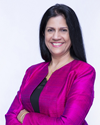
Prof Singh is the Dean, School of E-Education (SEED), HBMSU from 2014 to date. Prior to this, she was with the Open University Malaysia and University Malaya. She has been in academia for 35 years and her expertise is e-learning and learning design. Prof Singh is an international consultant and trainer in instructional and learning design and e-learning and has contributed to the following organizations worldwide – COL (Commonwealth of Learning), World Bank, IDRC (International Development Research Centre), Kingdom of Saudi Arabia, UNESCO and UNDP. Together with a team from Indiana University (2001-2010) she has researched and published extensively on re-purposable learning objects, leading to 4 International Awards. Recently Prof Singh has been involved in projects with UNESCO-IBE in training educators in the Arab region on progressive curriculum designs and development. Prof Singh is a past President of the Malaysian Fulbright Alumni. Her current research interest are in use of analytics, artificial intelligence and neural networks in creating powerful and impactful smart learning environments.
Dr Jian Song, Professor, Department of Electronic Engineering, Tsinghua University, China
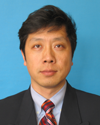
Dr. Jian Song received his B. Eng and PhD degrees from Electronic Engineering Department, Tsinghua University, China, and conducted Postdoctoral research work in Hong Kong and Canada in 1996 and 1997, respectively. He worked in USA for seven years, and joined Tsinghua University in 2005 as a full professor. He is now Director of DTV Technology R&D Center, one of major technical contributors for Chinese DTV standard.
He is vice chairman of WP6A of International Telecommunication Union (ITU) and becomes the founding Editor-in-Chief of ITU academic Journal, ICT Discoveries in 2017. He is Associate Editor of IEEE Transaction on Broadcasting.
Dr. Song’s current research interest includes digital broadcasting, network convergence, and integration of visible light and powerline communications. He is the recipient of the Best Paper Award from IEEE Transactions on Broadcasting in 2015, and also the recipient of several national and provincial/ministry level awards.
Dr. Song has published over 240 peer-reviewed journal and conference papers with good citation record. He is the co-author of one English book as well as two Chinese books in DTV area.
Dr. Song is the Fellow of IEEE, IET, and Chinese Institute of Electronics.
Dr Susan Teltscher, Head, Human Capacity Building Division and Head, a.i., ICT Data and Statistics Division, ITU
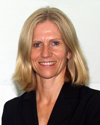
Dr Susan Teltscher is Head of the Human Capacity Building Division (since March 2016) and Head, a.i., of the ICT Data and Statistics Division of the International Telecommunication Union’s Telecommunication Development Bureau. In this context, she is responsible for ensuring the delivery of ICT-related capacity building activities and projects, with the objective to enhance knowledge and capabilities in the field of ICT, in particular in developing countries. This includes the direction and coordination of the ITU Academy and of the ITU Centers of Excellence network, working in partnership with Government, industry and academic institutions. She is also responsible for ITU’s work on the collection, harmonization, analysis and dissemination of ICT statistics worldwide, and for the production of analytical reports on global and regional trends in ICT, including the annual ITU Measuring the Information Society Report and the ICT Development Index.
Before joining ITU in July 2008, she was Chief of the ICT Policy and Analysis Unit, ICT and E-Business Branch, of the United Nations Conference on Trade and Development, Geneva. Dr Teltscher received her Ph.D. in Economic Geography in 1992 from the University of Washington (Seattle, United States).
Dr Zoltan Toth, Senior Lecturer, Kalman Kando Faculty of Electrical Engineering, Obuda University, Budapest, Hungary

Dr. Zoltan Toth is a senior lecturer in the Institution of Communication Engineering at the Kalman Kando Faculty of Electrical Engineering in Obuda Universtiy, Budapest, Hungary. He has a PhD in Computational Neuroscience from Manchester University. He has authored over 25 publications, more than 10 International papers and several teaching materials. Dr. Toth has been the recipient of a number of prestigious grants among which are grants from Erasmus, BBSRC, and Sony. Currently, Dr. Toth is also involved as a Researcher with the MTA-SE Neuropsychopharmacology and Neurochemistry Research Group.
Ms Tiina Tuulos, Project Manager, Aalto Design Factory, Aalto University, Finland

Tiina Tuulos is the project manager of Aalto University Design Factory (ADF). ADF is an experimental learning platform and as the project manager Tiina is responsible for its operational management, development activities, and community building. Recently Tiina has been coordinating a global design-based learning experiment between six different institutions in the Design Factory Global Network. She has a MSc in Economics and Business Administration from Aalto University School of Business. As a part of her master’s thesis she was developing a learning environment at Graz University of Technology that supports experiential and hands-on learning and interdisciplinary product development activities. Previously Tiina has worked as Communications specialist at ADF (2011-2014), and as a coach and change agent in Graz University of Technology (2013) in Austria. Her research interests lie in exploring how physical space can enhance interactions and how we can facilitate change through new ways of working. She is passionate about supporting and creating environments where creativity and innovation spread like a virus, and ecosystems where co-creation between different stakeholders and disciplines flourishes.
Dr Péter Vári, Deputy Director General, National Media and Infocommunications Authority of Hungary
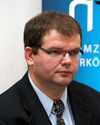
Dr Péter Vári attended Széchenyi István Technical College, from 1987 to 1990, majoring as wireless networking technology engineer. He then graduated from the Budapest University of Technology in 1994 as Electrical Engineer in telecommunications. In 2001 he earned the postgraduate certificate at the Budapest University of Economic Studies as an Engineer-economist. In 2003 he completed the postgraduate course at Eötvös Lóránd University (ELTE), Budapest as an Engineer-lawyer. He received his Ph.D. in 2017 at Corvinus University of Budapest on the topic of Digital Television and Switchover.
Dr Vári worked as an engineer from 1992 to 1993 for Matáv Rt., the largest telecommunications operator in Hungary. From 1993 to 2004 he worked for Antenna Hungária Rt., the Hungarian Broadcasting and Radio Telecommunications Limited Company, where he started as Head of Unit and worked his way up to become Director of Operational Matters. In 2004-2006 he was Head of Department in the Ministry of Informatics and Communications of Hungary, and in 2006-2008 he was Senior Counsellor of the Government at the Hungarian Prime Minister’s Office. In 2009, as a project manager, he began to coordinate the digital switchover at Antenna Hungária Rt., and in 2011 he started working in the National Media and Infocommunications Authority of Hungary (NMHH). Currently, as a Deputy Director General of NMHH, he is responsible for the fields of frequency and identifier management, measurement affairs and technology analysis.
Dr Vári is a forensics expert of electronic communications and broadcasting, and an ITU expert on digital switchover.
Dr Vári is a senior lecturer of the Department of Telecommunications at Széchenyi István University of Győr and gives courses in the field of radio systems and satellite telecommunications .
He is married with two children.
Dr Cosmas Zavazava, Chief of Department, Projects and Knowledge Management, ITU
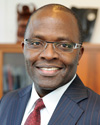 Cosmas Zavazava works in the Telecommunication Development Bureau of the ITU. Since 2001, Cosmas Zavazava has been passionately designing and implementing ICT projects for both sustainable development and public safety of ITU Member States. He has a track record in high-level negotiations, resource mobilization and publishing. He writes of the use of ICT to address the unique needs of least developed countries, landlocked developing countries, Small Island Developing States, developing countries in general, and disaster risk reduction and management. He is currently working on solutions to mitigate the Ebola disease and epidemics in general through ICT including harvesting big data. He taught MBA classes with a focus on strategic management, management information systems and other related topics. He has spoken at many international conferences to include the Fourth United Nations Conference on Least Developed Countries that was held in Istanbul, Turkey in May 2011, the Third United Nations Conference on Small Island Developing States held in Apia, Samoa in August 2014, the Third United Nations Conference on Disaster Risk Reduction held in Sendai, Japan from 14 to 18 March 2015. Dr Cosmas Zavazava: PhD, LLM in Telecommunication and Information Technology Law, MA (summa cum laude), MBA, BBA, Dipl. Telecommunications and Systems Engineering.
Cosmas Zavazava works in the Telecommunication Development Bureau of the ITU. Since 2001, Cosmas Zavazava has been passionately designing and implementing ICT projects for both sustainable development and public safety of ITU Member States. He has a track record in high-level negotiations, resource mobilization and publishing. He writes of the use of ICT to address the unique needs of least developed countries, landlocked developing countries, Small Island Developing States, developing countries in general, and disaster risk reduction and management. He is currently working on solutions to mitigate the Ebola disease and epidemics in general through ICT including harvesting big data. He taught MBA classes with a focus on strategic management, management information systems and other related topics. He has spoken at many international conferences to include the Fourth United Nations Conference on Least Developed Countries that was held in Istanbul, Turkey in May 2011, the Third United Nations Conference on Small Island Developing States held in Apia, Samoa in August 2014, the Third United Nations Conference on Disaster Risk Reduction held in Sendai, Japan from 14 to 18 March 2015. Dr Cosmas Zavazava: PhD, LLM in Telecommunication and Information Technology Law, MA (summa cum laude), MBA, BBA, Dipl. Telecommunications and Systems Engineering.
Dr Ronda Zelezny-Green, Educator and Researcher, Royal Holloway, University of London, United Kingdom
 Ronda is a mobile technologist, educator, and researcher, whose professional experience spans the public, private, and civil society sectors. She specializes in educational technology (especially mobile learning), gender, teaching and training, and policy advice. She has provided quantitative and qualitative market insight and analysis as well as project implementation leadership for a wide range of stakeholders including schools, mobile network operators, governments, and international NGOs. Ronda regularly publishes in academic forums and is globally recognized as the world's foremost expert in gender and mobile learning. She recently completed her PhD in Human Geography with an ICT4D focus at Royal Holloway, University of London.
Ronda is a mobile technologist, educator, and researcher, whose professional experience spans the public, private, and civil society sectors. She specializes in educational technology (especially mobile learning), gender, teaching and training, and policy advice. She has provided quantitative and qualitative market insight and analysis as well as project implementation leadership for a wide range of stakeholders including schools, mobile network operators, governments, and international NGOs. Ronda regularly publishes in academic forums and is globally recognized as the world's foremost expert in gender and mobile learning. She recently completed her PhD in Human Geography with an ICT4D focus at Royal Holloway, University of London.